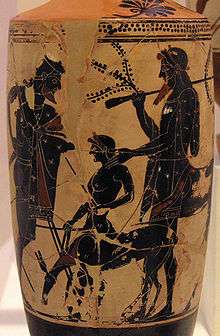Precepts of Chiron

A lekythos taken to depict Peleus (left) entrusting his son Achilles (center) to the tutelage of Chiron (right), c. 500 BCE, National Archaeological Museum of Athens
The Precepts of Chiron (Ancient Greek: Χείρωνος ὑποθῆκαι, Cheírōnos hypothêkai) is a now fragmentary Greek didactic poem that was attributed to Hesiod during antiquity. The poem was presented in the voice of Chiron, the wise centaur, as he instructed a young Achilles.[1] To judge from the few fragments that are preserved in other ancient authors, the hero's lessons consisted of moral, religious and practical advice.[2] As such, the poem shows affinities not only with the Hesiodic Works and Days,[3] with which it shared its hexameter verse form, but also with the gnomic elegies of Theognis.[4]
Select editions and translations
Critical editions
- Hesiodi, Eumeli, Cinaethonis, Asii et Carminis Naupactii fragmenta, Guil. Marckscheffel (ed.), Lipsiae, sumtibus Fr. Chr. Guil. Vogelii, 1840, pp. 370-1.
- Hesiodi carmina, Johann Friedrich Dübner (ed.), Parisiis, editore Ambrosio Firmin Didot, 1841, p. 61.
- Rzach, A. (1913), Hesiodi Carmina (3rd rev. ed.), Leipzig, ISBN 3-598-71418-1 External link in
|title=(help). - Merkelbach, R.; West, M.L. (1967), Fragmenta Hesiodea, Oxford, ISBN 0-19-814171-8.
- Merkelbach, R.; West, M.L. (1990), "Fragmenta selecta", in F. Solmsen, Hesiodi Theogonia, Opera et Dies, Scutum (3rd rev. ed.), Oxford, ISBN 0-19-814071-1.
Translations
- Evelyn-White, H.G. (1936), Hesiod, the Homeric Hymns, and Homerica, Loeb Classical Library, no. 57 (3rd rev. ed.), Cambridge, MA, ISBN 978-0-674-99063-0 External link in
|title=(help). (The link is to the 1st edition of 1914.) - Most, G.W. (2006), Hesiod: Theogony, Works and Days, Testimonia, Loeb Classical Library, no. 57, Cambridge, MA, ISBN 978-0-674-99622-9.
- Most, G.W. (2007), Hesiod: The Shield, Catalogue, Other Fragments, Loeb Classical Library, no. 503, Cambridge, MA, ISBN 978-0-674-99623-6.
Notes
- ↑ Pausanias 9.31.5.
- ↑ Most (2006, p. lxii), West (1978, p. 23).
- ↑ Friedländer (1913, p. 571).
- ↑ Cingano (2009, p. 128).
Bibliography
- Cingano, E. (2009), "The Hesiodic Corpus", in Montanari, Rengakos & Tsagalis 2009, pp. 91–130 Missing or empty
|title=(help). - Friedländer, P. (1913), "Ὑποθῆκαι", Hermes, 48: 558–616, JSTOR 4473419.
- Montanari, F.; Rengakos, A.; Tsagalis, C. (2009), Brill's Companion to Hesiod, Leiden, ISBN 978-90-04-17840-3.
- Schwartz, J. (1960), Pseudo-Hesiodeia: recherches sur la composition, la diffusion et la disparition ancienne d'oeuvres attribuées à Hésiode, Leiden.
- West, M.L. (1966), Hesiod: Theogony, Oxford, ISBN 978-0-19-814169-3.
- West, M.L. (1978), Hesiod: Works & Days, Oxford, ISBN 0-19-814005-3.
This article is issued from Wikipedia - version of the 10/23/2016. The text is available under the Creative Commons Attribution/Share Alike but additional terms may apply for the media files.